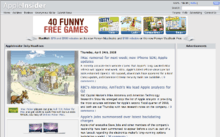Apple community
The Apple community are people interested in Apple Inc. and its products, who report information in various media. Generally this has evolved into a proliferation of websites, but latterly has also expanded into podcasts (both audio and video), either speculating on rumors about future product releases, simply report Apple-related news stories, or have discussions about Apple's products and how to use them.
Such stories and discussions may include topics related to physical products like the Macintosh and iOS devices (e.g. the iPhone, iPod, and iPad); software and operating systems, like Final Cut Pro, iWork, iOS, and macOS; or even services Apple offers like iCloud, iTunes Store, or Apple Music. Apple enjoys a cult-like following for its platforms, especially following the massive increase in popularity for the brand brought about by the huge increase in sales for all its products that started around the time the company introduced the original iPod in late 2001. The mass usage of computing devices in everyday life, mixed with Apple's vertical integration of its products and services,[1] has helped to bring about this increase in popularity, and combined with a tight-lipped corporate policy about future products, helped foster an interest in the company's activities.
Sites and publishers
The Apple community is made up of several websites which exclusively, or almost exclusively, specialize in Apple products. Some have ceased operation, but a great many continue to run successfully.
In addition to these purely Apple info sites, most other mainstream technology journalism sites, including Ars Technica, Engadget, Gizmodo, CNET, Slashdot, and GigaOM include Apple sections, and many prominent bloggers also talk extensively about Apple products, including DaringFireball.
9to5Mac
9to5Mac was founded in 2007 by Seth Weintraub as an Apple news website originally focused on Macs in the enterprise. Since then, the website has expanded to covering all things Apple. 9to5Mac is known as the leading website within the Apple News Community in terms of breaking impactful news. The site gained fame in its earlier years for publishing the first photos of the third-generation iPod nano, the original iPod touch, early photos of the first iPhone, and details about Apple's still-in-use aluminum manufacturing process for laptops. In recent years, 9to5Mac published the first accurate details about the iPhone 4S, Siri, Apple's move from Google Maps to Apple Maps, new health and fitness applications, OS X updates, and the Apple Watch. The site also published the first photos of the white iPad 2, iPhone 5, and the iPad Air. The creation of 9to5Mac as well as its top authors were profiled in 2014 by Business Insider.[2]
AppleInsider

Launched in 1998 as a news and rumor website for Apple products and services, appleinsider.com includes a forum for discussion of news stories and other community news.
In the late 1990s Apple successfully sued John Doe from AppleInsider's boards with the username "Worker Bee" for revealing information on what would eventually become the Apple Pro Mouse. It was a rare case of Apple following through on threats of a suit. The case was settled out of court.[3]
MacIssues
MacIssues is the renewal of what began in March 1996 as "MacFixIt," an update site for Ted Landau's Mac troubleshooting book "Sad Macs, Bombs and Other Disasters."[4] The site was originally called "The Sad Macs Update Site" but was renamed to MacFixIt after hosting problems. The site has changed hands, being sold to TechTracker in July 2000, which was purchased by CNET in 2007. With CBS Interactive's acquisition of CNET in 2008, MacFixIt was integrated into the main CNET blog structure. MacFixIt was discontinued by CNET, but the site has spawned MacIssues.com, which continues to offer daily Mac-related troubleshooting, how-to, and review articles, and is written primarily by Christopher (Topher) Kessler.[5]
MacOS Rumors
MacOS Rumors was founded by Ethan C. Allen in 1995 as one of the very first, if not the first, "Apple rumors" sites. His early worked was noticed and referenced by other print media. Allen was only 16 at the time, but had developed extensive source contacts. Apple, at the time, was unhappy with some of the releases on the site, which proved to be early and accurate. Apple was not happy with the leaks, and contacted Allen requesting he stop releasing data from his sources. The MacOS Rumors site was obtained by Ryan Meader after a domain expiration within two years of its creation. Originally with Ethan, the site posted most of its rumors based on screenshots and info sent via email from followers. With Ryan at the helm, MacOS Rumors collected content from message boards and usenet posts but later claimed (unsubstantiated) to have developed contacts inside Apple. In the past few years MacOS Rumors has gained a reputation for being inaccurate.[6] Meader had allowed the MacOS Rumors domain name to expire around July 16, 2007, but then renewed the domain for another nine years and announced the addition of a new staff writer.
MacRumors
MacRumors was launched in February 2000 by Arnold Kim, as an aggregator of Mac-related rumors and reports around the web. MacRumors attempts to keep track of the rumor community by consolidating reports and cross-referencing claims, with the website's tag line being "News and Rumors You Care About". In addition to providing rumors, news, and an active forum, the site also broadcasts live coverage of Apple announcements via MacRumorsLive.com.
MacRumors is also home to one of the largest Mac-focused forum sites, and by 2010 it had over 400,000 members and over 10,000,000 forum posts,[7] which by April 2012 was had risen to over 690,000 members and over 14,300,000 posts.
MacRumors has an official IRC channel (found at irc.krono.net #macrumors) where current events are discussed in real time. It is also a place where many Mac users seek assistance from other users, with the channel being moderated by "operators" who provide assistance.
Macworld
Macworld is one of the oldest magazine publications focused on Apple products and software, starting in 1984. It received competition with the launch of MacUser the following year. The two magazines merged under the "Macworld" name in 1997. In September 2014 it discontinued its print edition, instead focusing on its website coverage only.[8]
ThinkSecret
Think Secret appeared in 1999. Apple filed a lawsuit against the company alleging it printed stories containing Apple trade secrets.[9] In December 2007 the lawsuit was settled with no sources being disclosed; however, the site was shut down, finally closing on February 14, 2008.[10]
In the year leading up to the closing of the site, ThinkSecret correctly predicted an aluminum shell iMac, development of a touchscreen based iPod starting in 2006, and the relative BlackBerry-esque form factor of the new iPod Nano. However, there were still some reports that turned out to be false, such as its prediction of the demise of the Mac Mini, when it received an upgrade in mid-2007, albeit with no fanfare.[11]
TUAW (The Unofficial Apple Weblog)
The Unofficial Apple Weblog (TUAW) was founded in 2004, and claimed to be "a resource for all things Apple and beyond". TUAW published news stories, credible rumors, and how-to's covering a variety of topics daily. As a trusted tech blog, TUAW provided opinion and analysis on the news in addition to the facts.[12] TUAW was known for its rumor roundups, seeking to dispel false Apple rumors from around the web. On February 3, 2015, TUAW was shut down by its owners, Weblogs, Inc.[13]
Macintosh User Groups
Macintosh User Groups (MUGs) are a group of people who use Macintosh computers made by Apple Inc. or other manufacturers and who use the Apple Macintosh operating system (OS). These groups are primarily locally situated and meet regularly to discuss Macintosh computers, the Mac OS, software and peripherals that work with these computers. Some groups focus on the older versions of Mac OS, up to Mac OS 9, but the majority now focus on the current version of Mac OS, macOS. These user groups began with the formation of the Apple User Group Connection.
Apple's response
Apple's official stance on speculation around any future product releases, is that they do not directly comment on such speculation nor discuss any products, until they are finally released.[14] Historically, Apple has often used legal means, such as cease and desist orders, in order to retain trade secrets, intellectual property, or confidential corporate information, when needed. Typically, Apple has primarily pursued the leakers of information themselves, rather than any sites containing rumors on their products. However, Apple's suit against Think Secret in 2005 targeted whether these sites have the right to knowingly publish this protected information.[15] Staff are also required to sign non-disclosure clauses within the company.
During his January 10, 2006 keynote address to the Macworld Conference & Expo in San Francisco, Apple's then CEO Steve Jobs poked fun at the rumors community by pretending to create a "Super Secret Apple Rumors" podcast during his demonstration of new features in GarageBand.[16]
On October 16, 2014 at a WWDC keynote, Craig Federighi pretended to "triple down on secrecy" by hiring Stephen Colbert as "Supreme Commander of Secrecy." He poked fun at the "spaceship" rumors.[17]
See also
References
- ↑ Lyons, Daniel (January 28, 2010). "Going Vertical: Apple returns to an old—and potentially lucrative—way of doing business". Newsweek. Retrieved March 29, 2012.
- ↑ Smith, Dave (October 14, 2014). "How An IT Guy Stranded In Paris Turned Himself Into The Most Powerful Source Of Apple News". CNet News. Retrieved December 1, 2014.
- ↑ Fried, Ina (December 21, 2004). "Apple goes to court to smoke out product leaker". CNet News. Retrieved June 5, 2006.
- ↑ "Tedlandau.com". Tedlandau.com. Retrieved April 25, 2014.
- ↑ "MacIssues Site Profile". Macissues.com. March 18, 2014. Retrieved April 25, 2014.
- ↑ Chartier, David (October 5, 2007). "Rumor: Apple TV to gain HD content, optical drive". Ars Technica. Retrieved April 25, 2014.
- ↑ "MacRumors reaches Ten Million Forum Posts". Macrumors.com. 2010-05-29. Retrieved 2014-04-25.
- ↑ Yu, Roger (September 10, 2014). "Macworld shuts down print product, lays off staff". USA Today. IDG. Retrieved September 20, 2015.
- ↑ "Apple Targets Harvard Student For Product 'Leaks'". Information Week. January 13, 2005. Retrieved January 8, 2006.
- ↑ Arnold Kim (February 15, 2008). "ThinkSecret.com Now Offline". MacRumors. Retrieved April 24, 2008.
- ↑ Jeff Longo (August 7, 2007). "Apple Quietly Updates Mac Minis". MacRumors. Retrieved January 23, 2010.
- ↑ "About TUAW". Retrieved March 25, 2013.
- ↑ Sande, Steven (February 3, 2015). "So long, and thanks for all the fish". TUAW. Retrieved February 3, 2015.
- ↑ InfoWorld. InfoWorld Media Group, Inc. 1985-12-23.
- ↑ Apple Computer, Inc., v. Nick Deplume, The Deplume Organization LLC, and Does 1-20, case 1-05-CV-033341, Cal. Superior Ct, (Santa Clara), 2005.
- ↑ Graham, Jefferson (January 10, 2006). "Jobs basks in iPod sales, plugs Macs with Intel chips". USA Today. Retrieved April 24, 2008.
- ↑ "Apple triples down on security by 'hiring' Stephen Colbert". CNET. October 16, 2014. Retrieved August 6, 2015.
